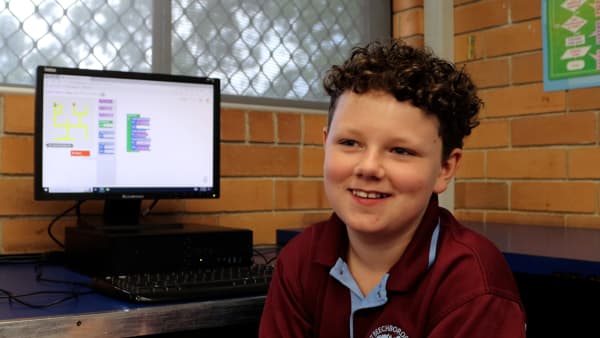Stepping up into the world of high school
Aset Penerbit
24 January 2024
From the big fish in the little pond, to the small fish in a very large pond.
That is how David Sullivan, Associate Principal at Kiara College, summed up the transition from primary school to high school, meaning that a child can often feel like a fish out of water.

Flynn, who is starting Year 7 at Kiara College in 2024, enjoying his digital technologies class.
Kiara College host its Year 7 orientation over three transition days to help to make its students start to high school as comfortable, and as smooth, as possible.
Mr Sullivan said that the time that they get over the 3 days gives them time to slow down the orientation process.
“Students get exposed to different classes, electives and teachers, and also meet new people and start to form friendships,” he said.
“They get a feel for the school, and we can do some work to make them feel comfortable and familiar.”
Flynn, who is starting Year 7 at Kiara College in 2024, said he found the transition days really fun, and loved that it is three days instead of just one, like other schools do.
“My favourite part has been getting to go to Agriculture classes, because we got to hold chickens and pat goats,” he said.
“It’s pretty cool that there is a farm at the school.”
Tips to help your child transition to high school
Starting high school means big changes for your child, such as new friends, more classes and teachers, more study and homework, and a new and bigger campus. Help your child transition to high school with these tips.
Take the pressure off
Year 7 can come with a lot of big changes. It really is a year for your child to find their feet and get a taste of what high school is like.
They will get the chance to learn new subjects and have different teachers. It’s important to encourage your child to try new things, and find out what they like and have strengths in.
Talk to your child about school
Talk positively to your child about starting high school, share your experiences and stories to help them feel at ease.
It is important to keep the conversation going. Make time to talk with your child regularly and check in with how they are feelings and how they are doing.
Does your child respond with one word answers when you ask how their day was?
Try asking these questions to help draw out the conversation.
- What was the best thing about your day?
- Tell me one thing you discovered today?
- What was your favourite class today and why?
- Who did you have lunch with today?
- What are you most looking forward to doing at school tomorrow?
Making new friends
Your child may feel the pressure to make new friends and it is common for them to feel worried and nervous.
Get your child involved in school activities, learning a musical instrument, trying out new sports, or joining an after-school club. These are all great ways to meet new people with similar interests and hobbies.
Help your child stay connected with their friends from primary school, as well as providing opportunities for them to make new ones. Try to be available to have their new friends over or drop your child to a new friend’s house.
If they are struggling with making new friends, reach out to the school to see if they have a club or buddy system.
Have a relationship with the school
Learn about what supports or programs are in place for a smooth transition and begin to build a relationship with the school.
Try to be involved in your school community. Be across any school communication and key events.
If you have any concerns about issues your child is having at home, or at school, reach out to their teacher, student services, school physiologist or year coordinator.
For more information, visit Progressing through school
You may also find these sites useful:
- Reachout for parents, transition to high school for teenagers
- Headspace, transition from primary to secondary school - supporting your young person
- Raising children, starting secondary school